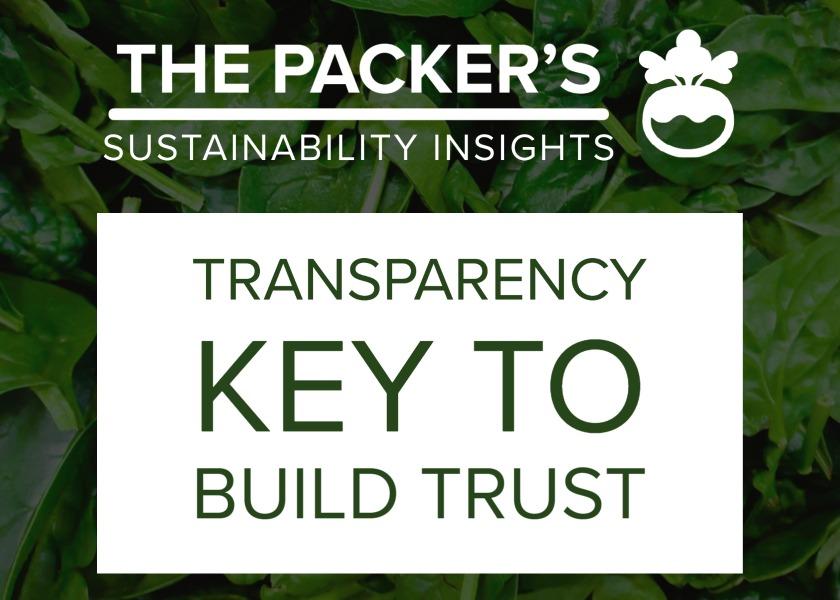Transparency key to build trust

Trust is built through transparency.
The Packer’s sustainability survey, performed by Aimpoint Research with support by Apeel Sciences and Emerald Packaging, found that transparency is important to two-thirds of consumers and three-fourths support government-mandated transparency labeling. In Next Generation Research among 18- to 54-year-olds in December 2019, consumers rated sustainability importance this way:
Extremely important, 38%; very important, 30%; somewhat important, 24%; not very important, 7%.
Consumers view food processors/companies and farms as most transparent, but no entity captures more than half of consumers’ trust.
Responding to the question, “Who is most transparent, in your opinion, in terms of delivering information to you regarding their sustainability practices and policies?” when they could select all that apply, consumers said:
- Food processing companies: 48%;
- Farms: 40%;
- Retailers: 26%;
- Distributions/logistics: 19%;
- Fertilizers and additive manufacturers: 17%;
- Seeds manufacturers: 16%;
- Other: 1%;
- None of the above: 19%.
Consumers and growers most trust farms when it comes to communicating truthfully about sustainability, according to the research. However, transparency from field to market is likely necessary for consumers to truly trust and believe farmers.
There is a large disconnect between growers and consumers around trust of farms, although consumers and growers most trust farms when it comes to communicating truthfully about sustainability.
Responding to the question, “Who do you trust more to communicate truthfully with regard to sustainability?” growers and consumers responded:
- Farms: growers, 79%; consumers, 44%;
- Government/national authorities: growers, 10%; consumers, 27%;
- Food processors: growers, 16%; consumers, 23%;
- Retailers: growers, 13%, consumers, 20%;
- Distribution/logistics: growers, 8%; consumers, 14%;
- Fertilizer and additive manufacturers: growers, 9%; consumers, 20%;
- Seed manufacturers: growers, 10%; consumers, 13%;
- Other: growers, 3%; consumers, 1%;
- None of the above: growers, 6%; consumers, 15%.
Researchers said transparency is important. The consumers may never investigate how food is being grown, but they need access to build trust.
Consumers may trust local food and organic food more because of assumptions they make, said Marcello Sasso, vice president of Aimpoint Research.
Those assumptions may or may not relate to facts, he said.
“Consumers make this assumption that if it’s grown locally, then (the produce) doesn’t need to travel so much, may need less fertilizer and inputs and probably doesn’t need as much packaging,” he said.
The organic label also tells a story.
“If the label says organic, they have all these assumptions behind it being organic, that it probably used less fertilizer, that it has been stressing the soil less, all kinds of assumptions,” he said. “So trust is there, but it’s mainly based on assumptions.”
An organic label can be an easy way for consumer to assume sustainability, Sasso said.
“When you buy a zucchini at a grocery store, can you tell whether it was raised sustainably? No, it is just an anonymous green thing on a shelf. If the consumer only has information that one zucchini is labeled and the other is not, consumers may be inclined to believe that organic is more sustainable.”
Even if the produce is not organic or local, the messaging on labels is an important way to communicate to consumers about the product.
Sustainability is important among all demographic categories, especially households with children. According to Aimpoint research, 91% of consumers would like to pursue a sustainable life. Many are voting with their wallet by buying recycled packaging, avoiding disposable plastic products, and carefully selecting ingredients and brand.
Watch all of the Sustainable Produce Summit sessions right here.
Here are a few ways to ensure you never miss The Packer's sustainability content:
Catch up on what you missed at our first Sustainable Produce Summit, including full videos of the keynotes and presentations. Watch here.
Lettuce Learn More is a podcast focused on produce industry education, brought to you by The Packer. Season one of the podcast features educational sessions from the Sustainable Produce Summit. Listen here.







